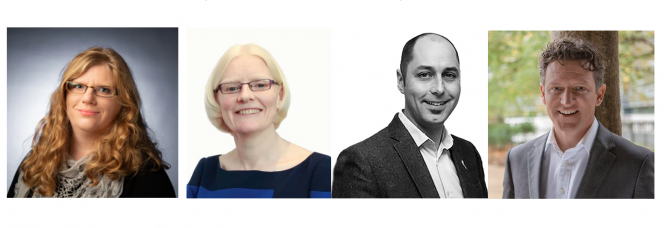The Maynooth University Strategic Plan 2023-2028 notes, in the context of students’ evolving and future needs, that ‘Our curriculum and programme delivery will be developed to be flexible and responsive’ and built on ‘the broad-based, research-informed and critically-reflective education for which we are known’ (2023, p. 14). Features of this education will include: the development of student capacities, personal attributes and skills, particularly ‘future focussed skills in data and digital literacy’ (2023, p. 17); experiential learning; co-design of curricula and assessments with students and external partners; education for sustainable development; and the overarching transversal theme of Equity, Diversity and Inclusion (EDI). Specifically, the Strategic Plan 2023-28 includes a Five Year Focus on Student & Learning Goal to:
create a dynamic, responsive and inclusive learning environment, in partnership with our
students, in which we provide an excellent and transformative education that enables our
graduates to make impactful contributions to society.
The range of intentions noted in the Strategic Plan is reflective of contemporary universities’ need to ‘embrace multiple missions’ thus raising questions on ‘strategy, priority-setting and resources’ (Gaebel and Zhang, 2024, p. 36). An education framework offers the University community a practical way to operationalise strategic intentions and to achieve the broader institution mission in an aligned and coherent manner. Crucially, articulating in curricular terms the characteristics of a Maynooth University education can, as Tight suggests, ‘link the details of course design with the student experience of entering, moving through and transitioning beyond higher education’ and ‘offer a broader, and potentially more integrated, perspective on the teaching/learning function of higher education’ (2024, p. 324).
References
Gaebel, M. and Zhang, T. (2024). TRENDS 2024. European higher education institutions in times of transition. Brussels: European University Association. Accessible at: https://www.eua.eu/publications/reports/trends-2024.html
Maynooth University (2023). Maynooth University Strategic Plan 2023-2023. Excellence. Opportunity. Impact. Accessible at: https://www.maynoothuniversity.ie/presidents-office/maynooth-university-strategic-plan-2023-2028
Tight, M. (2024). ‘The curriculum in higher education research: A review of the research literature’, Innovations in Education and Teaching International, 61:2, 315-328,
DOI: 10.1080/14703297.2023.2166560
The LEAF initiative is guided by an advisory group made up of students and staff.
The advisory group helps to ensure that the project goals are achieved, provides insights, advice and guidance, and contributes to the sharing of information about the initiative with the university community.
Máire Buckley, Experiential Learning, Student Skills and Success
Dr Denis Casey, Critical Skills
Laura Connaughton, Library
Clare Cullen, Centre for Teaching and Learning
Paddy Daly, IT Services
Dr Majella Dempsey, Education and Faculty of Social Sciences
Marianne Dunne, Student Services
Dr Alison Farrell, Centre for Teaching and Learning
Dr Aisling Flynn, Student Skills and Success
Dr Susi Gottlöber, Philosophy and Faculty of Arts and Humanities
Prof Frances Heaney, Chemistry and Faculty of Science and Engineering
Kyla Henry, Maynooth Students’ Union
Dr John Keating, Computer Science and Faculty of Science and Engineering
Dr Adrienne Kendlin, Curriculum and Registry
Dr Teresa Lee, Quality Assurance and Enhancement Office
Niamh Lynch, Registry
Roddie Mac Aonghusa, Maynooth Students’ Union
Dr Eoghan Moloney, Ancient Classics and Faculty of Arts and Humanities
Dr Tracey Ní Mhaonaigh, NuaGhaeilge and Faculty of Arts and Humanities
Dr Niamh Ní Shiadhail, President’s Office
Dr Edward O'Connor, School of Business and Faculty of Social Sciences
Lisa O’Regan, Centre for Teaching and Learning
Dr Tazila Ramputh, Centre for Teaching and Learning
Dr Rose Ryan, Maynooth Access Programme
Dr Helen Shaw, Geography and Faculty of Social Sciences
Prof Jennie Stephens, ICARUS
Prof Tim Thompson, Office of Vice President Students & Learning
From left to right: Dr Ceridwen Coulby, University of Liverpool; Dr Ide O'Sullivan, University of Limerick; Dr Barry Ryan, TU Dublin; Dr Paul Warwick, University of Plymouth.
As part of the development of the Maynooth Education Framework we will work with an External Expert Advisory Panel. Working with this panel facilitates our learning from colleagues across the higher education sector who have completed curriculum/education framework development work to date.
The External Expert Advisory Panel comprises Irish and international colleagues, with four members in total. All members of the panel have substantial expertise and practical experience in this area.
We are grateful to the following panel members who are generously contributing to our work:
Dr Ceridwen Coulby, University of Liverpool
Dr Íde O’Sullivan, University of Limerick
Dr Barry Ryan, Technological University Dublin
Dr Paul Warwick, University of Plymouth.
Key project deliverables are
- Maynooth University Education Framework
- Maynooth University Programme Leaders Toolkit
- Maynooth University Module Leaders Toolkit
- Discipline specific case studies of implementation of Leaders Toolkits
The project will include the following outputs and/or processes
- Literature review on national and international contemporary education/curriculum frameworks in higher education
- Identification of examples of contemporary approaches to or models of education/curriculum frameworks in higher education
- Key informant consultations with national and international education/curriculum framework experts
- Drawing on previous staff and student consultation processes e.g. consultation on Maynooth University strategic plan, to inform aspects of Education Framework, for instance, values, principles, priorities
- High-level review/mapping process of current approaches to module and programme design being used in Maynooth University and of key Maynooth University policies, strategies, processes and university-wide initiatives which will inform the Education Framework to ensure institutional alignment
- Open invitation to contribute and ongoing consultation with Maynooth University staff and students on the Education Framework and potential implementation of same
- Consultation with relevant Maynooth University committees
- Reports, videos and infographics communicating various stages of the process
- Process document outlining the initiative steps
- Publishing and dissemination of work more broadly nationally and internationally

